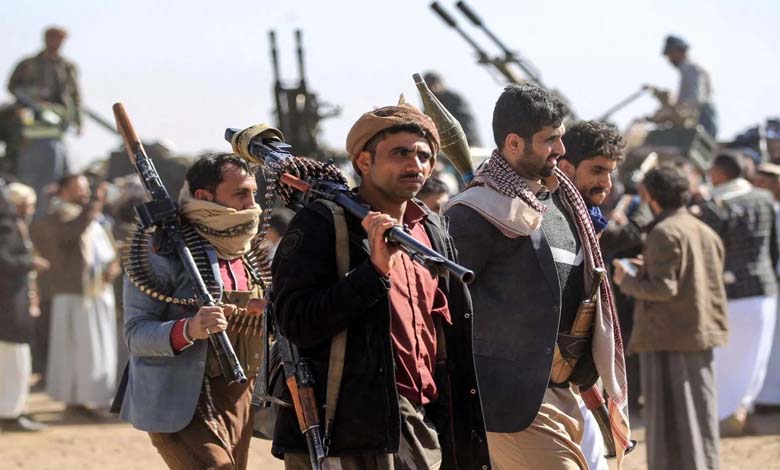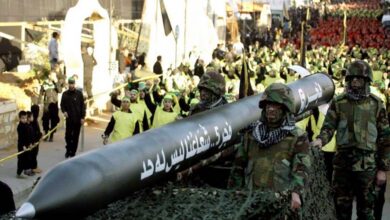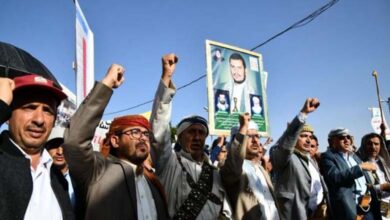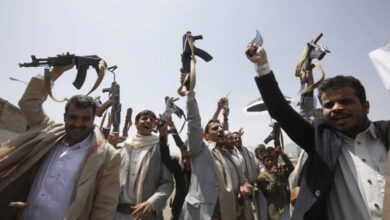Houthi Forced Levies: Organized Looting of Citizens under the Pretext of Zakat

The Iran-backed Houthi militia continues to drain the financial resources of citizens in areas under its control by imposing forced levies under the guise of “zakat” (Islamic almsgiving), showing complete disregard for the worsening economic and living conditions of the population. This coercive policy is part of a systematic strategy to plunder resources and seize the nation’s wealth under a false religious pretext, while in reality, these funds flow into the coffers of the militia’s leaders and finance its military operations.
-
State of Panic and Anxiety among Houthi Terrorist Militias… Precautionary Measures Taken
-
“Tightened Measures”: Houthi Militias Hide Their Leader from “American Hell”
Organized Taxation despite Worsening Poverty
Local sources report that the Houthi militia has launched a large-scale campaign to collect zakat funds, instructing neighborhood leaders and its appointed supervisors to forcibly extract money from citizens. According to available information, the group has mandated every family to pay a fixed amount of 475 Yemeni riyals per person, regardless of the household’s financial situation or the number of family members, ignoring the severe economic hardships faced by the population.
Eyewitnesses confirm that Houthi operatives have employed threats and intimidation tactics to enforce these levies, resorting to arbitrary arrests and assaults against those who refuse to pay. This has sparked widespread anger and public discontent.
-
Human Rights Organization Records 13,000 Houthi Violations in Yemen’s Al-Bayda
-
A Media Campaign Exposes the Brotherhood-Houthi Collusion – Details
Embezzlement of Funds and Distribution to Houthi Leaders
The true purpose behind collecting zakat funds was never to aid the poor and needy, as the militia falsely claims, but rather to fuel an organized looting scheme. In Ibb Governorate, neighborhood leaders revealed that more than 1.5 billion Yemeni riyals from zakat revenues were embezzled, funds that the Houthis had claimed were allocated to poor families.
Instead of distributing these funds to rightful beneficiaries, the militia granted substantial sums to its loyalists, while the majority was funneled into its war efforts—purchasing weapons and financing military activities. As a result, many residents in Ibb and its districts reported being removed from zakat beneficiary lists despite their dire circumstances, while the funds were redirected into the pockets of Houthi leaders and their fighters.
-
Washington Allocates $15 Million to Disrupt Houthi Financing after Reclassifying Them as Terrorists
-
Houthis Launch Ideological and Military Recruitment Campaign for Students Amid Public Outrage
Extorting Traders and Farmers: Disguised Taxes Under the Name of Zakat
These practices were not limited to impoverished families; traders and farmers also found themselves under growing pressure to pay exorbitant sums under the pretense of “trade zakat” or “agricultural zakat.”
In Sana’a, Ibb, and Dhamar, Houthis forced shop owners to pay excessive levies far beyond the legitimate zakat requirements. The militia threatened to shut down businesses or seize property in cases of non-compliance, forcing some traders to close their shops for fear of bankruptcy or direct targeting.
Farmers, too, faced systematic looting of their crops, as the militia imposed heavy deductions on their agricultural output as “zakat,” despite the fact that many were already suffering losses due to rising farming costs and restrictions on importing fertilizers and pesticides.
-
Abdelkarim Al-Ansi: The Houthis Exploit Mosques to Advance Their Sectarian Agenda Ahead of Ramadan
-
Houthis Torture a Young Man to Death for Refusing to Join Their Training… Details
A Systematic Approach to Wealth Plundering and Impoverishing the People
These repeated campaigns reflect a deliberate strategy by the Houthi militia to exploit and impoverish the population under various pretexts. Since seizing control of Sana’a, the group has continuously imposed illegal taxes and levies, including so-called “war effort contributions” and “support for religious occasions,” all aimed at extorting residents and securing perpetual funding for its military activities.
With growing public outrage over these policies, observers warn that the continuation of these forced levies could lead to an even greater humanitarian catastrophe, as millions of Yemenis already suffer from hunger and extreme poverty. Instead of providing aid to needy families, the militia exploits zakat funds for political and military gains, showing no regard for the suffering it has inflicted on the people.
-
4 Days Until the Houthis Are Designated as a Terrorist Organization… What Is the Militia’s Future?
-
They Swap Roles… How the Houthi Gang Profits from the Brotherhood’s Corruption in Liberated Areas
Political analyst Marzouq Al-Sayyadi stated that the actions of the Iran-backed terrorist militia are part of a systematic policy to plunder and impoverish citizens, exacerbating Yemen’s economic crisis, which has worsened due to the war sparked by the group’s coup against the legitimate government.
Al-Sayyadi added that the Houthis‘ enforcement of forced financial levies under the pretext of zakat is merely an extension of their broader strategy to drain the Yemeni population to finance their wars. “This group has not only stolen humanitarian aid and monopolized markets but is now imposing illegal taxes on citizens, including the poor, with complete disregard for the deteriorating humanitarian situation,” he concluded.












